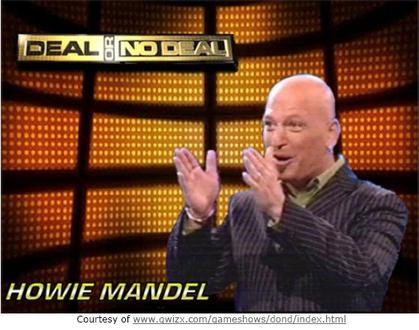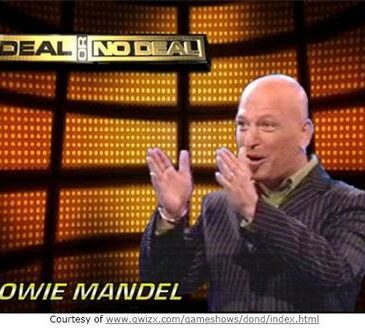From online poker to day trading, various forms of gambling permeate our culture in new and unique ways. Although legal gambling once was restricted, today there is widespread accessibility to old and new forms of gambling. It is possible that such increases in access reflect a cultural attitude change towards gambling. Primetime television programs such as “Las Vegas” and “Celebrity Poker Showdown” demonstrate that gambling interests have increasingly been integrated into mainstream society. Very successful television game shows straddle the line between contest and gambling; the success of these programs further illustrates our culture’s greater acceptance of gambling. For example, NBC’s hit game show, “’Deal or No Deal’, “tailored to our Powerball-playing, lottery-loving times” has captured much attention nationwide (Lowry, 2005, p. 1).
Howie Mandel hosts “Deal or No Deal” and asks participants to pick out of twenty-six numbered briefcases containing the potential contest prize amounts ranging from one penny to millions of dollars. First, participants select one briefcase that remains unopened during the game. That briefcase identifies the amount of their prize. Then they continue to select from the remaining briefcases. The selected brief cases are opened and the prize amounts are revealed. Those amounts are then eliminated from the possible values in the participants’ unopened briefcase. The revealed values may indicate that their “own” briefcase has a high or low value. At various steps, a “banker” calls the host to offer the contestant a “deal”, i.e., a dollar amount to stop playing and forfeit the amount of money contained in their “own” briefcase. Whenever the banker offers a deal, the contestants have to decide whether to accept the deal or continue playing; effectively betting that their “own” case offers a larger prize then the banker’s offer. Friends, family members, and audience members contribute their advice and excitement. The host, Howie Mandel, claims the show is more than a game of chance but others contend that “it is entirely a game of chance” (Garron, 2005).

It is fascinating indeed to watch many of the contestants—and their friends and families—concentrate so much about the possibility of winning millions of dollars that they ignore the probability of actually winning that much money. Viewers at home can experience the vicarious pleasure and excitement of a potential large win, while the actual probabilities are flashed to viewers during the show. “Deal or No Deal” promotes games of chance and subtly feeds people’s fascination with gambling. Thus, television programs like “Deal or No Deal” illustrate society’s increasing acceptance of gambling with its gambling related themes; taken together, these shows and their audiences reflect a contemporary “gambling culture”.
Furthermore, Deal or No Deal’s website provides a link to king.com, an international gaming community that includes an online version of Deal or No Deal. This game does not offer actual cash prizes to non-members and is free to play; however, subscribers are eligible to compete for cash. King.com claims to only offer games of skill and not games of chance. But, like Deal or No Deal, the site reveals the world’s captivation with gambling.
Television game shows like “Deal or No Deal” which demonstrate the increased normalcy of gambling in our society can be risky. Viewers, particularly young viewers, of gambling related programs might be more likely to engage in gambling than non-viewers. In addition, recovering problem gamblers may suffer relapse after watching these shows. Future research should examine these issues and explore the relationship between gambling and exposure to popular culture, like television. Similarly, prevention programs for gambling should take note of this increased awareness in their efforts to effectively reduce problem gambling. Therefore, it is important, as both viewers and researchers, to be cognizant of the various ways gambling has been popularized in our society.
What do you think? Comments can be addressed to Sarbani Hazra.
References
Garron, B. (2005). Deal or No Deal. Retrieved October 3, 2006, from http://www.hollywoodreporter.com/thr/search/article_display.jsp?schema=&vnu_content_id=1001700163
Lowry, B. (2005). Deal or No Deal. Retrieved 2006, Oct 3, from http://www.variety.com/review/VE1117929140?categoryid=32&cs=1




